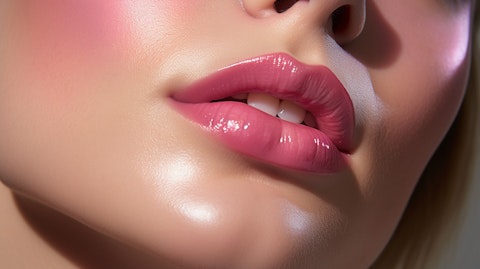We recently published a list of 12 Best Beauty Stocks to Buy According to Hedge Funds. In this article, we are going to take a look at where e.l.f. Beauty, Inc. (NYSE:ELF) stands against other best beauty stocks to buy according to hedge funds.
According to a report by McKinsey, in 2023, the global beauty market expanded by 10%, reaching $446 billion in retail sales, mostly due to price hikes rather than volume advances. North America and Europe grew steadily, but the Middle East & Africa (18%) and Latin America (17%) grew at the quickest rates, with China trailing behind at 3% because of poor consumer sentiment. The market is expected to reach $590 billion by 2028 at a compound annual growth rate (CAGR) of 6%, with growing markets and Asia-Pacific driving development. Skincare (44% of the market) had stable growth, while fragrance (14%) was the category with the quickest rate of growth, driven by luxury niche brands. Beauty businesses must employ premiumization, innovation, and skin care-infused cosmetics to transition from price-driven to volume-driven growth to maintain momentum, especially in high-growing markets like the Middle East and India.
A significant contributor to the American economy, the beauty industry generated $94.36 billion in sales in 2023 and employed 4.6 million people in manufacturing, retail, and distribution. Costs increased by 6.5% due to inflation, which affected customer spending patterns and raised demand for reasonably priced “dupes.” In 2023, e-commerce beauty sales reached $21.3 billion, a reflection of changing consumer preferences. Despite economic downturns, consumers continue to make little luxury purchases, a phenomenon known as the “lipstick effect.” Private equity investors show their confidence in the potential of the beauty industry by continuing to invest in scalable beauty brands. Disruptions in the supply chain have pushed up near-shoring initiatives, which have helped create jobs in the United States. DC Advisory states that “the beauty sector’s adaptability ensures long-term relevance and economic impact.”
Recently, as the holiday season approached, the U.S. beauty business was still doing well, with mass market sales up 2% year over year and the prestige market expanding 7% to $22.8 billion, according to Circana. Lipcare sales increased 21% in dollars and 23% in units, due to high demand for tinted balms and oils. As a result of consumers’ price sensitivity, mid-range skincare brands are expanding six times faster than luxury skincare. Sales of fragrances surged 14%, with premium brands up 15%, while prestige hair care climbed 8%, driven by style and scalp care items. According to 29% of customers, the Christmas season is a critical time to purchase beauty presents. Larissa Jensen, global beauty industry advisor at Circana stated:
“Prestige beauty epitomizes the indulgence in little luxuries and acts as an indicator of the consumer mindset for the beauty industry overall,” “This holiday season, its resiliency will be tested. There has been some pullback in spending throughout 2024, but big increases in prestige beauty spend from higher-income households with children under 18-years-old indicate parents are indulging Gen Alpha with these products. The social media virality of this new generation of beauty enthusiasts shows no sign of slowing and could be a pivotal holiday growth driver.”
The increasing integration of artificial intelligence (AI) appears to have affected every business, and the beauty industry is no different. AI is already changing the way beauty brands function, and its impact is only going to increase. According to a survey by Perfect Corp., 77% of experts in the beauty industry think that conversational AI agents—like chatbots and virtual assistants—offer unparalleled possibilities for customizing encounters. These tools enable accurate answers to questions, individualized product recommendations, and immediate, round-the-clock customer support.

A close up of the lip and eye products from the company on a model in a fashion and beauty shoot.
Methodology
We sifted through holdings of beauty ETFs and online rankings to form an initial list of 20 beauty stocks. From the resultant dataset, we chose 12 stocks with the highest number of hedge fund investors, using Insider Monkey’s database of 900 hedge funds in Q3 2024 to gauge hedge fund sentiment for stocks. We have used the stock’s Revenue Growth Rate (year-over-year) as a tie-breaker in case two or more stocks have the same number of hedge funds invested.
Why are we interested in the stocks that hedge funds pile into? The reason is simple: our research has shown that we can outperform the market by imitating the top stock picks of the best hedge funds. Our quarterly newsletter’s strategy selects 14 small-cap and large-cap stocks every quarter and has returned 275% since May 2014, beating its benchmark by 150 percentage points. (see more details here).
e.l.f. Beauty, Inc. (NYSE:ELF)
Number of Hedge Fund Holders: 40
Revenue Growth Rate (year-over-year): 76.89%
The multi-brand beauty company and one of the Best Beauty Stocks, e.l.f. Beauty, Inc. (NYSE:ELF) sells cruelty-free, vegan, clean, accessible, and inclusive cosmetics and skin care items. The company’s goal is for every eye, lip, face, and skin concern to have access to the best of beauty. Through its retail locations and online platforms, the company sells cosmetic accessories for women, such as eyeliner, mascara, false eyelashes, lipstick, face foundation, moisturizer, cleanser, and other supplies. The company sells products under the trademarks e.l.f. Cosmetics, W3LL PEOPLE, and Keys Soulcare. It sells both domestically and internationally, with the United States accounting for the majority of its revenue.
e.l.f. Beauty, Inc. (NYSE:ELF) was a huge success for a large portion of 2024, recording impressive growth and engaging Gen Z consumers seeking high-quality products at competitive prices. The company’s commitment to vegan and cruelty-free products appeals to the younger generation.
The company exceeded forecasts in the fiscal second quarter of 2025, with a 40% increase in revenue fueled by global expansion and online sales. The firm recorded gains in market share and sales for the 23rd straight quarter. Although e.l.f. Beauty, Inc. (NYSE:ELF) spends much on marketing and digital costs, along with some other operating expenses, it nevertheless has wide gross margins.
e.l.f. Beauty, Inc. (NYSE:ELF) secured the top spot in terms of unit share in the mass cosmetics industry in the United States after gaining 195 basis points in market share. Sales abroad increased by 91% YoY, and in Germany’s 1,600 Rossmann stores, the business emerged as the leading cosmetics brand. While the Beauty Squad loyalty program grew by 30% to reach 5.3 million members, digital engagement increased by over 40% year over year. The company increased its FY25 target to 28%-30% net sales growth, citing its excellent performance.
Ken Griffin’s Citadel Investment Group was the largest stakeholder in the company among the funds in Insider Monkey’s database at the end of Q3 2024. It owns 769,200 shares worth $83.87 million as of Q3.
Polen U.S. Small Company Growth Strategy stated the following regarding E.l.f. Beauty, Inc. (NYSE:ELF) in its Q3 2024 investor letter:
“The Portfolio’s top detractors were Progyny, elf Beauty, and Alarm.com. E.l.f. Beauty, Inc. (NYSE:ELF), a discount beauty company focused on cosmetics and skincare, is a new addition to the Portfolio this quarter. Please see Portfolio Activity below for further detail. We are intrigued by the company’s impressive track record for growth, margins, and returns on capital. While elf has reported significant results all year, shares came under pressure, in our view, as short-term investors primarily appeared to anticipate a slowdown in revenue growth, possibly due to investor concerns of market saturation, economic conditions, and valuation concerns, among other factors. While we are confident in how we underwrote our initial investment for returns above the portfolio average, the stock has come under even more pressure than we anticipated. We used this weakness to add to our position. We’re intrigued by the strength elf has experienced across its retailer and ecommerce channels, particularly in taking market share in a challenging consumer environment, given their relatively inexpensive prices vs. competitors.
elf Beauty, described above, is a discount beauty company focused on cosmetics and skincare. We find the company’s reputation for quality, innovation, and prices below mass cosmetics brands to be uniquely positioned. While this combination of innovation, quality, and value has led to compelling growth, we still believe it’s early days for the company. elf’s brand awareness is significantly less than that of more prominent players; it is still adding shelf space, expanding its product portfolio, and entering the skincare market. elf is also still a US-focused business, with some early signs of international success. The company’s financial profile is strong, and we expect EPS to grow by 25% over the long term.”
Overall, ELF ranks 6th on our list of best beauty stocks to buy according to hedge funds. While we acknowledge the potential for ELF to grow, our conviction lies in the belief that some AI stocks hold greater promise for delivering higher returns and doing so within a shorter time frame. If you are looking for an AI stock that is more promising than ELF but that trades at less than 5 times its earnings, check out our report about the cheapest AI stock.
READ NEXT: 20 Best AI Stocks To Buy Now and Complete List of 59 AI Companies Under $2 Billion in Market Cap
Disclosure: None. This article is originally published at Insider Monkey.





